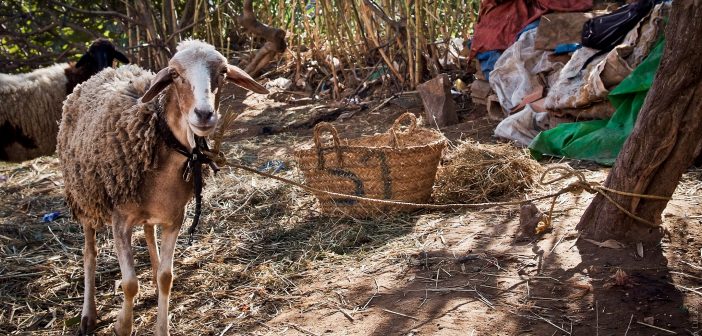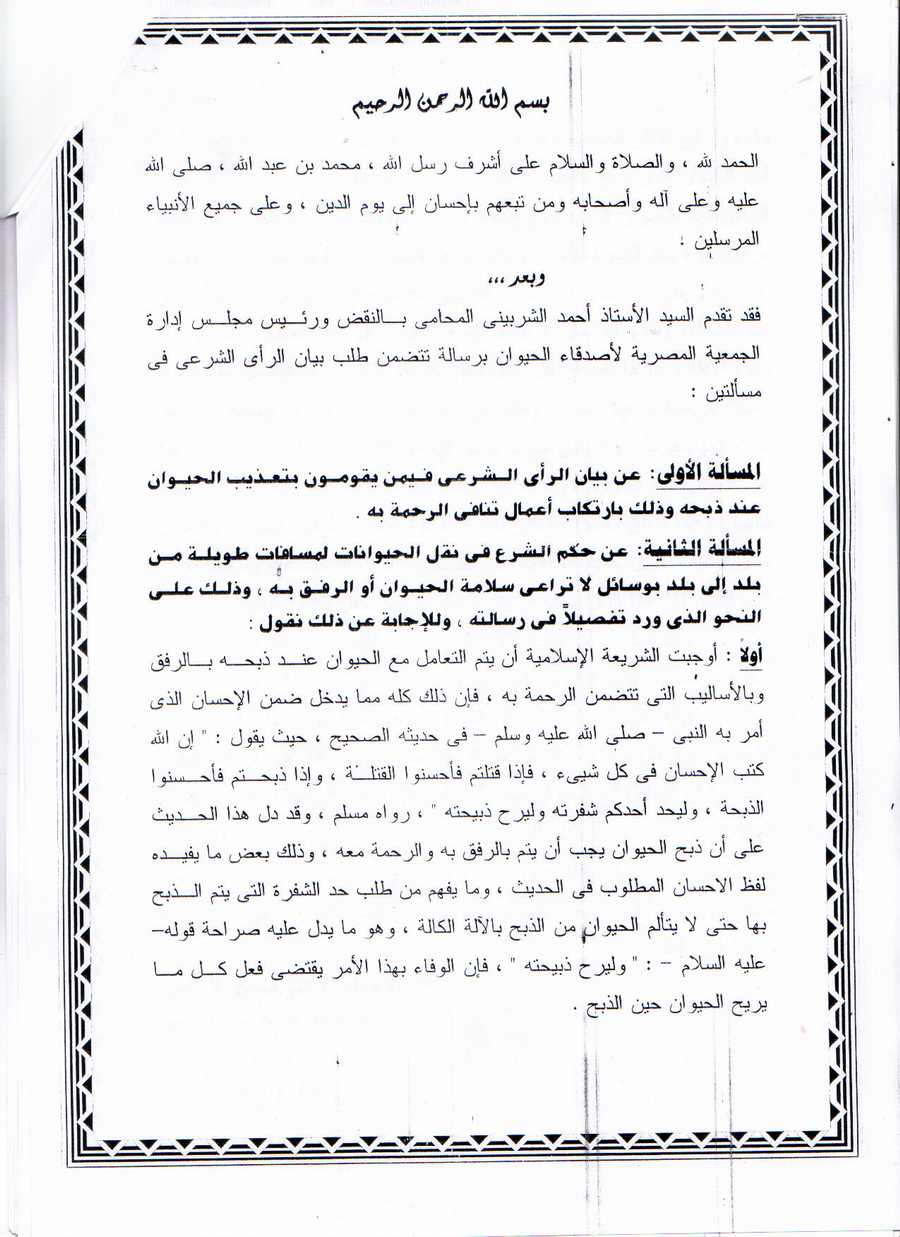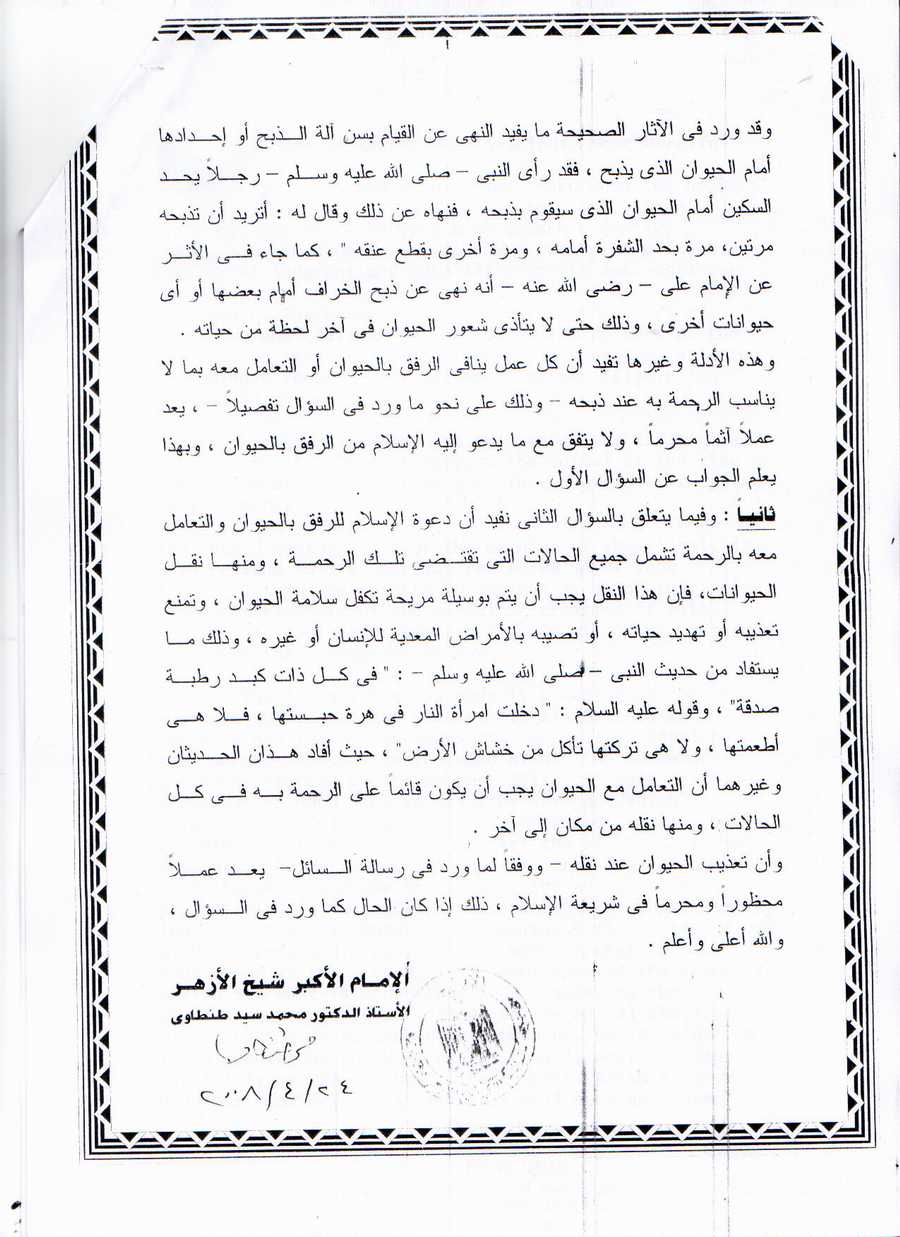(Featured image courtesy TheAnimalDay.org, used under CC BY 2.0)
In 2008, Sheikh Muhammad Sayed Tantawi issued a fatwa, or Islamic legal ruling, on the proper treatment of animals during transport and Halal slaughter, in response to an inquiry by Ahmed el-Sherbiny of Egyptian Society of Animal Friends. The fatwa states unequivocally that cruelty to animals is haram (forbidden) under Islamic law. As the Chief Imam and Shaikh of Al-Azhar University, the world’s foremost center of Islamic learning, Muhammad Sayed Tantawi’s expert opinion is considered authoritative for Sunni Muslims worldwide. It provides a tremendous boon for activists working to improve the treatment of animals in Muslim societies.
We at the Animal People Forum have decided to publish the fatwa, along with the original inquiry from Ahmed el-Sherbiny, as a resource for Muslim practitioners, animal activists, scholars, and the general public. We offer it in three languages: English, its original Arabic, and a Chinese translation by Dr. Zu Shuxian:
Additionally, the fatwa can be automatically translated into any of the 100+ languages supported by Google Translate, using the widget at the top of this web page.
__
Document One: Letter from Ahmed el-Sherbiny to Shaikh Tantawy
Egyptian Society of Animal Friends
Communication 2798 of year 2006
In the name of God, the Most Compassionate and Most Merciful
His Excellency Dr. Muhammad Sayyid Tantawy
Shaikh of Azhar
May God protect Him
God’s Peace, Blessing and Mercy upon You:
It is well-known that Islam has called for kindness to animals, and has made human beings responsible for caring for them in order that animals remain beneficial for humans and do not turn into a source of danger to life and health. This Islamic care for animals stands out as one of the aspects of Islamic civilization that is concerned with animals and humans alike.
In a time when Islam is subjected to these unjust attacks that accuse it of aggressiveness, wanton disregard for human life, and destruction of the environment, highlighting Islam’s concern with kindness to animals is regarded an effective subject area through which to defend against many of these wrongful accusations.
In order to achieve this lofty goal, we submit to Your Excellence two questions that call for correct answers according to Islamic law, so that the West is able to be informed of the civilized face of Islam on the matter of kindness to animals. Because these two questions are related to violent and incorrect Islamic practices in the treatment of animals, from which one could understand that they are part of Islam, Islam could be insulted as a result.
These two questions are:
Question 1
Some of the people who slaughter animals and prepare the meat for consumers in the slaughterhouses commit cruel and violent acts with the aim of debilitating the animal so that they are able to control the animal. These acts include gouging the eye of the animal, cutting the tail, cutting a tendon of the legs, and piercing its body with a knife so that it bleeds and loses strength, all of which are done to control the animal with the least amount of human effort. What is the view of Islamic law on this?
Question 2
During long-distance transport between the countries of animals’ rearing and the countries of their slaughter, the animals are exposed to all types of cruelty, such as hunger, thirst, and severe crowding. These types of cruelty lead to the death of some of them or their affliction with deadly diseases that affect the animal’s surroundings and their meat. These results could be transmitted to human health. What is the rule of Islamic law on this? And what are the correct Islamic legal ways of transporting animals, from the perspective of the length of time and the care that must be provided to them?
May God give you success in serving Islam and the Muslims
Sincerely,
Ahmed el-Sherbiny
Attorney at Law
Chairperson of the Egyptian Society of Animal Friends
__
Document Two: Shaikh Tantawi’s reply to Ahmed el-Sherbiny
In the Name of God, Most Compassionate and Most Merciful
Thanks be to God, and prayers and peace upon the noblest of God’s messengers, Muhammad b. Abdullah, and God’ prayers be upon Him, His family, His companions, upon whomever has followed them to the Day of Judgment, and upon all of the Prophetic Messengers.
Mr. Ahmed el-Sherbiny, lawyer before the Court of Cassation and Chairman of the Egyptian Society for Animal Friends, has presented a letter that includes a request for a legal opinion on two matters. The first matter deals with those people who torture an animal at its slaughter by committing acts that are contradictory with treatment with mercy. The second matter deals with long-distance transport of animals from one country to another by means that do not provide for the animal’s safety or its kind treatment, in the method described in detail in the letter.
First:
Islamic law requires that the animal at the time of its slaughter must be treated with kindness and with procedures that guarantee to it mercy. All of this is covered by the beneficence that the Prophet (God’s peace and blessings upon Him) ordered in his authenticated saying: “God has ordered beneficence in everything, so if you kill, be as kind as possible in the killing, and if you slaughter, be as kind as possible in the slaughtering. One of you should sharpen your knife and one should make the animal to be slaughtered comfortable.” (Related by Muslim). This saying of the Prophet proves that slaughter must be done with kindness and mercy to the animal, and is part of the meaning conveyed by the required beneficence pronounced in the saying.
Kindness and mercy to the animal is also understood from the requirement of sharpness of the knife that will be used in the slaughter, so that the animal is not pained by slaughter with a dull instrument. This is also what He (God’s peace and blessings upon Him) clearly shows in His saying “one should make the animal comfortable.” Fulfilling this order requires doing everything that makes the animal comfortable at the time of slaughter.
Many authenticated sayings of the Prophet show the prohibition on undertaking to sharpen or hone the instrument of slaughter in front of the animal to be slaughtered. The Prophet (God’s peace and blessings upon Him) saw a man sharpening his knife in front of the animal that was going to be slaughtered, and the Prophet forbade that, and said to the man: “Do you want to slaughter the animal twice—once by sharpening the knife in front of the animal, and the second time by cutting its throat?”
Imam Ali (May God be pleased with him) also forbade slaughtering a sheep in front of the other sheep or any other animal, so that the animal’s perceptions are not harmed at the last moment of its life.
All of this proof clearly shows that any action incompatible with kindness to animals or treating them any way other than with mercy at the time of slaughter—such as in the manners mentioned in detail in the question—is a forbidden and sinful act, and is inconsistent with the kindness to animals that Islam requires. This is the answer to the first question.
Second:
With regard to the second question, we advise that Islam’s call for kindness to animals and for treating them with mercy applies to all of the situations in which this mercy is necessary. This includes transporting animals. The transport must be done in a way that is comfortable and that ensures the animal’s safety. The means of transport must protect against the causing of pain to the animal, threat to the life of the animal, or affliction of the animal with diseases contagious to humans or others. This rule is inferred from the saying of the Prophet, God’s peace and blessings upon Him, that “Humans have the chance to perform a charitable act in their treatment of every living being.” And also in His saying, Peace be upon Him: “A woman went to hell because of a cat that she had confined without leaving it any food, or allowing the cat access to bugs or fruits of the earth to eat.” These two sayings of the Prophet, and others like them, show that the treatment of animals must be based upon the principle of mercy in every situation, including in the transport of them from one place to another.
Causing pain to the animal during transport as described in the letter is considered an action prohibited and forbidden in Islamic law, assuming, of course, that the situation is as described in the question.
God knows best and is most supreme.
Chief Imam and Shaikh of al-Azhar
Dr. Muhammad Sayyid Tantawi
signed April 24, 2008
__
__
说明:8月29日,在印尼巴厘召开的2008年亚洲动物会议上,埃及动物之友协会主席艾哈默德·舍比尼报告了他向埃及爱资哈尔伊斯兰教教长坦塔维阁下询问,根据伊斯兰教法伊斯兰教徒应当怎样对待动物的问题及其所获得的答复。下面是这两封信件。信件的原文系阿拉伯文,由美国西北大学副教授Kristen Stilt博士译成英文,安徽医科大学教授祖述宪根据英文译成中文。供参考。
__
文件1.埃及动物之友协会主席艾哈默德·舍比尼(Ahmed el-Sherbiny)致坦塔维教长的信(2006年第2798号通信)
奉至仁至慈的真主之名
爱资哈尔穆罕默德·萨伊德·坦塔维教长阁下
愿真主保佑他
真主赐您平安、福佑与怜悯:
众所周知,伊斯兰教要求对动物仁慈,使人类负责任关照它们,以便动物有益于人,而不致成为人类生命与健康的危险来源。伊斯兰教这种对动物的关照,是关于动物与人的伊斯兰教文化的突出方面之一。
在一些时候,伊斯兰教受到不公正的攻击,被指责为好斗、漠视人的生命和破坏环境,因此,特别强调伊斯兰教仁慈地关照动物被认为是一个有效的主题,用来反驳许多错误的指责。
为了达到这个崇高的目标,我们谨要求阁下根据伊斯兰教法,对我们提出的两个问题予以正确的解答,使得西方国家能够根据我们对动物仁慈的情况,了解伊斯兰教文明的真相。由于这两个问题与伊斯兰教徒在对待动物上暴虐的和不正确的做法有关,因而人们可能认为这是伊斯兰教的一部分,而伊斯兰教也可能因此蒙辱。
这两个问题是:
问题一
在屠宰场里,有些屠宰动物并为消费者制备肉类的人采取残忍而暴虐的做法,目的在于击垮动物,以便他们易于控制动物。这些做法包括:抠出动物的眼睛,切掉尾巴,割断腿部的肌腱以及用刀刺戳动物的身体,使之流血和体力衰竭,所有这些做法都是为了自己花费最小的力气来控制动物。请问,对此伊斯兰法的观点是什么?
问题二
在动物从饲养国到屠宰国的长途运输中,动物身受诸如饥饿、口渴和极度拥挤的虐待。这些虐待导致一些动物死亡或患上严重的致命性疾病,其结果是影响动物的周围环境和所出产的肉品,由此可能损及人的健康。请问,伊斯兰教法对此有何规定?而伊斯兰教法规定的运输动物的正确方式,诸如运程时间长短和途中必须为动物提供的照顾条件是什么?
愿真主保佑您服务于伊斯兰教和穆斯林成功!
忠实的
哈默德·舍比尼律师
埃及动物之友协会主席
__
文件2.坦塔维教长给艾哈默德·舍比尼的复信
奉至仁至慈的真主之名
感谢真主,并祈祷降福于最高贵的真主信使、穆罕默德b阿卜杜拉,真主的祈祷降福于他、圣族和他的伙伴;降福于追随他们至世界末日的所有人们,以及所有先知的信使。
最高上诉法院律师、埃及动物之友协会主席艾哈默德·舍比尼先生呈我一信,要求解释两件事情的伊斯兰教法的观点。第一件事情是讨论在屠宰动物时做法上折磨动物的人,是与怜悯对待动物毫不相容的。第二件事情是讨论应用信中详述的不给动物提供安全或仁慈的方法,从一个国家到另一个国家动物长途运输的问题。
第一:
伊斯兰教法要求,动物在屠宰时必须受到仁慈的对待,采用的方法必须保证使其得到怜悯。所有这些都包含在善行之内,即先知(真主赐福他使他平安)在其圣训中所指示:“真主命令我们在每项事情上都要行善,因此,若需杀人,在杀人时要尽可能仁慈;若需屠宰,在屠宰时要尽可能仁慈。你们当中的人应当把刀磨得锋利,使动物在屠宰时没有痛苦。”(穆斯林圣训)先知的这个圣训证明,屠宰必须对动物仁慈和怜悯,而且是其圣训中宣布的要求善行所传达的意思的一部分。
从要求屠宰动物所用的刀子必须锋利,不致被钝刀屠杀产生痛苦,也可以理解到对动物必须仁慈和怜悯。这也就是先知(真主赐福他使他平安)在其圣训中明确指示的“人应当使动物在屠宰时没有痛苦”。达到这个圣训要求的任何一种做法,都要使动物在屠宰时没有痛苦。
先知的许多圣训都说,禁止在即将被屠宰的动物面前磨刀霍霍。先知(真主赐福他使他平安)见到一个男人在将即被屠宰的动物面前磨他的刀,先知不准他这样做,对这人说:“难道你想对这动物屠杀两次吗?一次是在它面前磨刀霍霍,第二次再去割断它的喉咙吗?”
伊玛目阿里(愿真主满意他)也禁止在其他羊或任何其他动物面前屠宰一只羊,使得动物在生命的最后时刻不致感觉到伤害。
所有这一切都清楚地证明,任何与对动物仁慈不相容的行动,或在屠宰时不符合怜悯的、任何如同前面详述的种种做法,都是被禁止的、罪恶的行为,与伊斯兰教所要求的对动物仁慈毫无共同之处。这是对第一个问题的回答。
第二:
至于第二个问题,我们的意见是,伊斯兰教要求对动物仁慈和用怜悯之心对待它们,适用于所有情况,在任何情况下这种怜悯都是必需的。这也包括运输动物在内,运输必须在动物舒适并保证动物安全的条件下进行。这意味着运输必须不致引起动物痛苦、不致威胁动物的生命和不致动物遭受疾病的折磨,传染与人或其他动物。这项教规是根据先知的圣训推断而来的,他说:“人在对待每一个生命时,都有机会做善行。”在圣训(真主赐福他使他平安)中还说:“一个妇人下了地狱,是因为她不给她圈养的一只猫任何食物,也不允许它能吃到地上的虫子和水果。”这两条圣训,还有其他类似的圣训证明,在任何情况下,对待动物必须基于怜悯原则上行事,包括从一地到另一地的运输。
在伊斯兰法中,如信中所说的在运输过程中造成动物的痛苦,被认为是一种受到禁止和不允许的做法,当然,假如像来信所提的问题中的情形。
真主全知全能,至高无上。
长老和爱尔爱资哈尔教长穆罕默德·萨伊德·坦塔维
签名于 2008年4月24日







